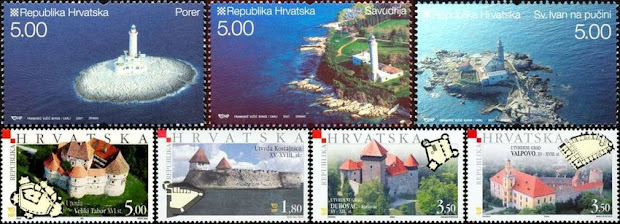On the day that media
speculate about the political future of Tourism minister Bajs, there is even more bad news for the man already under fire. First, the BBC has a lengthy article on its website about Croatia with the title "Croatia cursed by crime and corruption". It reads:
"Britain's Foreign Office is warning visitors to Croatia this summer to beware of a threat from organised crime, following a number of assassinations and attacks on prominent figures, reports Matt Prodger. "We heard a very loud and low noise, something like voooom!" On the evening of 23 October 2008, Irena Scuric was eating.." You can read the rest
here.
I heard the "voooom" too, as I was waiting for the tram on Zagreb's main square. First I thought the cannon on the Lotrščak Tower was fired. Every day, precisely at noon, the old cannon fires, something that can be heard at great distance. As it was around 17.30 I guessed they fired it for a special reason.
When I came home, I found out that the "voooom" was a blast that blew up Ivo Pukanić, a prominent journalist, and his car.
Once more the BBC. "Car bombs are one thing, corruption another, and you do not have to go far to find it. The newspapers are full of stories of dodgy dealings and prominent figures with unexplained wealth."

All of this is true, partly also because Croatian newspapers largely ignore things that happen elsewhere in the world. But is it necessary to warn visitors for "a threat from organised crime"? I think that is a bit too much. There is the
unsolved murder case in Dubrovnik, but generally Croatia is a very safe country. Just stay away from politics, war criminals, business tycoons, and you'll be pretty safe.

Anyway, the Foreign Office's warning comes at a delicate moment. Croatia is hit hard by the economic crisis and fears for a bad tourist season. Additional bad news is that less Europeans plan to spend their holidays in Croatia. According to the EU's
Survey on the attitudes of Europeans towards tourism 2,3 percent all non-domestic holidays would be spend in
Croatia, significantly less than the 3,4 percent of 2008.

This fact is lost on Croatian media.
Novi list, for example
writes under the title "Europeans love Croatia" that "one out of four Slovenes, 8 percent of the Czechs, 3 percent of the Poles and 13 percent of the Romanians and Slovaks" plan to go to Croatia in 2009.

Wonderful! But still bad news if you know that in 2008 an amazing 41 percent of Slovenian holidaymakers went to Croatia, 20 percent of the Slovaks, 18 percent of the Czechs, and so on.
So, when you do come to Croatia, you might have it all for yourself. Not so bad.
 Croats are generally quickly worried about their health, except when it come to food (too much meat, salt and fat, too little vegetables). We are being told not too panic, but at the same time the head of the Epidemiology Office says that we should "immediately contact a doctor" if we have symptoms of influenza such as "pain, headache and exhaustion" and the body temperature is above 38 degrees. During the weekend we should go to the hospital.
Croats are generally quickly worried about their health, except when it come to food (too much meat, salt and fat, too little vegetables). We are being told not too panic, but at the same time the head of the Epidemiology Office says that we should "immediately contact a doctor" if we have symptoms of influenza such as "pain, headache and exhaustion" and the body temperature is above 38 degrees. During the weekend we should go to the hospital.


























